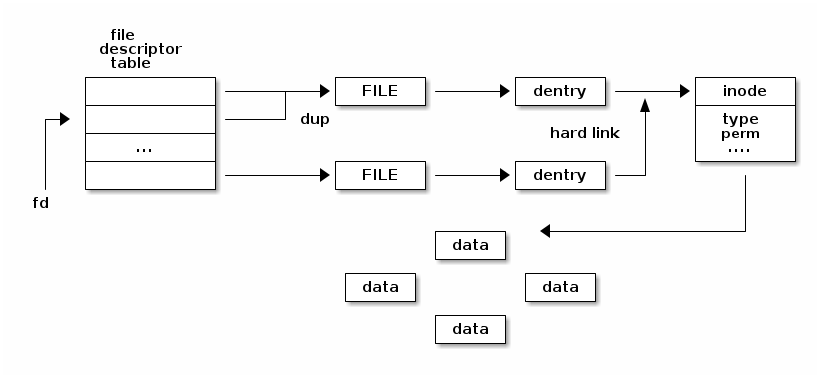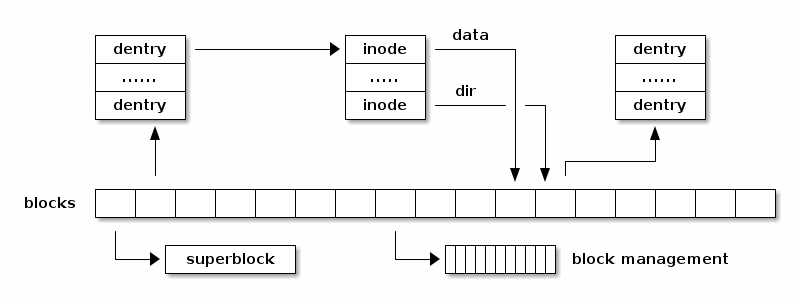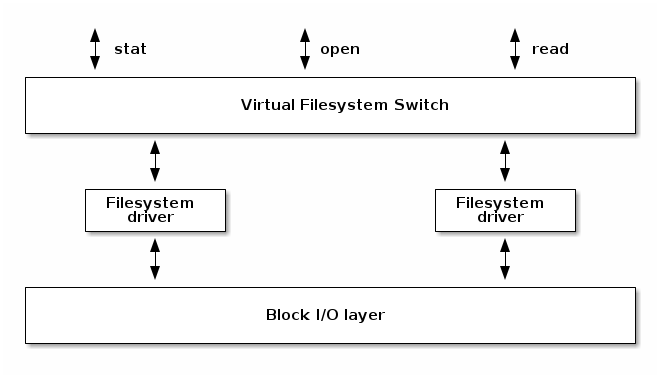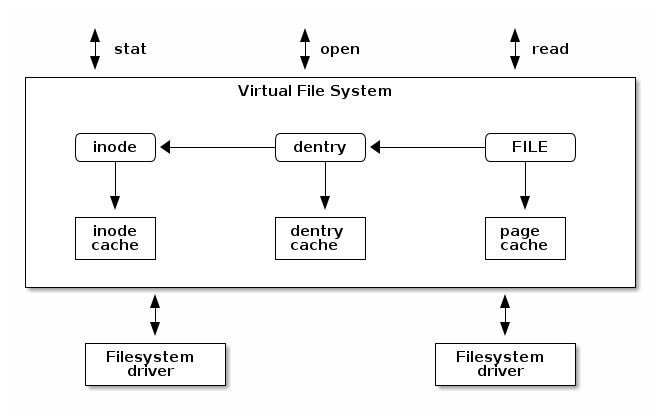Filesystem Management
- Filesystem abstractions
- Filesystem operations
- Linux VFS
- Overview of Linux I/O Management




Directories are special files which contain one or more dentries.

|
|
|
|
struct address_space to translate file offsets
to block offsets/**
* struct address_space - Contents of a cacheable, mappable object.
* @host: Owner, either the inode or the block_device.
* @i_pages: Cached pages.
* @gfp_mask: Memory allocation flags to use for allocating pages.
* @i_mmap_writable: Number of VM_SHARED mappings.
* @nr_thps: Number of THPs in the pagecache (non-shmem only).
* @i_mmap: Tree of private and shared mappings.
* @i_mmap_rwsem: Protects @i_mmap and @i_mmap_writable.
* @nrpages: Number of page entries, protected by the i_pages lock.
* @nrexceptional: Shadow or DAX entries, protected by the i_pages lock.
* @writeback_index: Writeback starts here.
* @a_ops: Methods.
* @flags: Error bits and flags (AS_*).
* @wb_err: The most recent error which has occurred.
* @private_lock: For use by the owner of the address_space.
* @private_list: For use by the owner of the address_space.
* @private_data: For use by the owner of the address_space.
*/
struct address_space {
struct inode *host;
struct xarray i_pages;
gfp_t gfp_mask;
atomic_t i_mmap_writable;
#ifdef CONFIG_READ_ONLY_THP_FOR_FS
/* number of thp, only for non-shmem files */
atomic_t nr_thps;
#endif
struct rb_root_cached i_mmap;
struct rw_semaphore i_mmap_rwsem;
unsigned long nrpages;
unsigned long nrexceptional;
pgoff_t writeback_index;
const struct address_space_operations *a_ops;
unsigned long flags;
errseq_t wb_err;
spinlock_t private_lock;
struct list_head private_list;
void *private_data;
} __attribute__((aligned(sizeof(long)))) __randomize_layout;
struct address_space_operations {
int (*writepage)(struct page *page, struct writeback_control *wbc);
int (*readpage)(struct file *, struct page *);
/* Write back some dirty pages from this mapping. */
int (*writepages)(struct address_space *, struct writeback_control *);
/* Set a page dirty. Return true if this dirtied it */
int (*set_page_dirty)(struct page *page);
/*
* Reads in the requested pages. Unlike ->readpage(), this is
* PURELY used for read-ahead!.
*/
int (*readpages)(struct file *filp, struct address_space *mapping,
struct list_head *pages, unsigned nr_pages);
void (*readahead)(struct readahead_control *);
int (*write_begin)(struct file *, struct address_space *mapping,
loff_t pos, unsigned len, unsigned flags,
struct page **pagep, void **fsdata);
int (*write_end)(struct file *, struct address_space *mapping,
loff_t pos, unsigned len, unsigned copied,
struct page *page, void *fsdata);
/* Unfortunately this kludge is needed for FIBMAP. Don't use it */
sector_t (*bmap)(struct address_space *, sector_t);
void (*invalidatepage) (struct page *, unsigned int, unsigned int);
int (*releasepage) (struct page *, gfp_t);
void (*freepage)(struct page *);
ssize_t (*direct_IO)(struct kiocb *, struct iov_iter *iter);
/*
* migrate the contents of a page to the specified target. If
* migrate_mode is MIGRATE_ASYNC, it must not block.
*/
int (*migratepage) (struct address_space *,
struct page *, struct page *, enum migrate_mode);
bool (*isolate_page)(struct page *, isolate_mode_t);
void (*putback_page)(struct page *);
int (*launder_page) (struct page *);
int (*is_partially_uptodate) (struct page *, unsigned long,
unsigned long);
void (*is_dirty_writeback) (struct page *, bool *, bool *);
int (*error_remove_page)(struct address_space *, struct page *);
/* swapfile support */
int (*swap_activate)(struct swap_info_struct *sis, struct file *file,
sector_t *span);
void (*swap_deactivate)(struct file *file);
};
/**
* generic_file_read_iter - generic filesystem read routine
* @iocb: kernel I/O control block
* @iter: destination for the data read
*
* This is the "read_iter()" routine for all filesystems
* that can use the page cache directly.
*
* The IOCB_NOWAIT flag in iocb->ki_flags indicates that -EAGAIN shall
* be returned when no data can be read without waiting for I/O requests
* to complete; it doesn't prevent readahead.
*
* The IOCB_NOIO flag in iocb->ki_flags indicates that no new I/O
* requests shall be made for the read or for readahead. When no data
* can be read, -EAGAIN shall be returned. When readahead would be
* triggered, a partial, possibly empty read shall be returned.
*
* Return:
* * number of bytes copied, even for partial reads
* * negative error code (or 0 if IOCB_NOIO) if nothing was read
*/
ssize_t
generic_file_read_iter(struct kiocb *iocb, struct iov_iter *iter)
/*
* Generic "read page" function for block devices that have the normal
* get_block functionality. This is most of the block device filesystems.
* Reads the page asynchronously --- the unlock_buffer() and
* set/clear_buffer_uptodate() functions propagate buffer state into the
* page struct once IO has completed.
*/
int block_read_full_page(struct page *page, get_block_t *get_block)